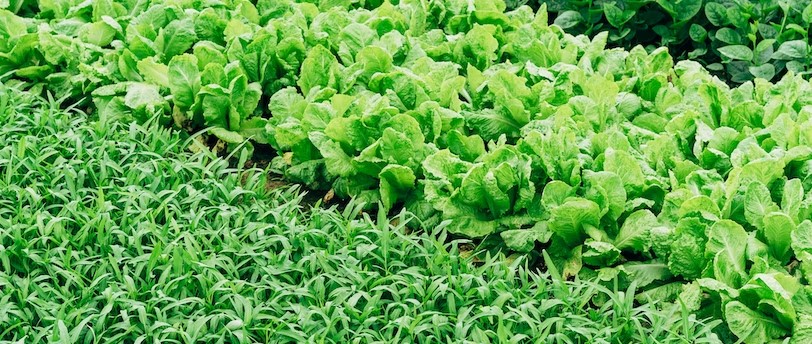Are you interested in making sustainable choices for the environment? If so, organic farming may be the answer. Organic farming is a method of agriculture that prioritizes environmental sustainability by utilizing natural processes and avoiding synthetic chemicals. In this article, we will explore the environmental impact of organic farming and why it is considered a sustainable choice.
Organic farming has been found to have several positive impacts on the environment. Firstly, it promotes biodiversity conservation. By avoiding the use of synthetic pesticides and fertilizers, organic farmers create a healthier ecosystem for various plant and animal species to thrive. This helps maintain balance in ecosystems and contributes to overall biodiversity conservation efforts. Additionally, organic farming practices prioritize soil health and fertility preservation. Through techniques such as crop rotation, composting, and using natural fertilizers, organic farmers enrich their soils with nutrients while reducing erosion and degradation. The result is improved soil quality that supports long-term agricultural productivity while minimizing negative impacts on surrounding environments such as waterways or neighbouring habitats.
Key Takeaways
- Organic farming promotes biodiversity conservation and creates a healthier ecosystem.
- Organic farming contributes to sustainable agriculture that benefits both the environment and crop yields.
- Organic farming reduces reliance on synthetic inputs and protects aquatic ecosystems from pollution.
- Transitioning to organic farming reduces carbon emissions and helps combat climate change.
Table of Contents

Biodiversity Conservation
Organic farming, with its focus on maintaining natural ecosystems, nurtures a vibrant tapestry of diverse species, creating a harmonious symphony of buzzing bees, fluttering butterflies, and chirping birds. One of the key benefits of organic farming is its ability to maintain ecological balance. By avoiding the use of synthetic pesticides and fertilizers, organic farmers ensure that beneficial insects and organisms can thrive alongside crops. This helps control pests naturally and reduces the need for chemical interventions that can harm both the environment and human health.
In addition to ecological balance maintenance, organic farming plays a crucial role in habitat preservation. Organic farmers prioritize practices that protect and enhance biodiversity by providing suitable habitats for various species. They cultivate hedgerows, plant trees, and create buffer zones around their fields to provide shelter and food sources for wildlife. These practices not only support pollinators but also encourage the presence of predators that keep pest populations in check. By preserving habitats through organic farming methods, we are safeguarding the homes of countless organisms that contribute to a healthy ecosystem.
Research consistently shows that organic farms have higher levels of biodiversity compared to conventional farms. A study conducted by the University of California found that organic farms had 30% more species diversity than conventional farms. This increased biodiversity has numerous benefits beyond just supporting wildlife populations; it also enhances ecosystem resilience against climate change impacts such as extreme weather events or disease outbreaks. By choosing organic products, consumers are actively supporting a sustainable choice that promotes ecological balance maintenance and habitat preservation while enjoying nutritious food grown in harmony with nature.
Overall, organic farming plays a vital role in conserving biodiversity by nurturing natural ecosystems through practices such as ecological balance maintenance and habitat preservation. By embracing these principles, organic farmers create thriving environments where diverse species can flourish alongside agricultural activities. The evidence consistently shows higher levels of biodiversity on organic farms compared to conventional ones, highlighting the positive impact this sustainable choice has on our planet’s delicate web of life. So, the next time you choose organic products, remember that you are not only supporting your health but also contributing to the conservation of our precious natural heritage.
Soil Health and Fertility Preservation
Take a moment to consider how prioritizing soil health and fertility preservation can truly transform the way you cultivate your land. By practising organic farming methods, you can actively contribute to preventing soil erosion and promoting nutrient cycling. Soil erosion prevention is crucial as it helps maintain the integrity of the topsoil, where most of the essential nutrients for plant growth reside. Through organic farming techniques such as cover cropping, contour ploughing, and terracing, you can minimize the risk of soil erosion caused by wind and water.
In addition to preventing soil erosion, organic farming also focuses on nutrient cycling. This process involves utilizing natural sources of nutrients rather than relying heavily on synthetic fertilizers. Organic farmers use crop rotation, composting, and green manure to enhance nutrient cycling in their fields. These practices not only provide plants with a balanced supply of nutrients but also improve overall soil fertility over time.
By adopting organic farming practices that prioritize soil health and fertility preservation, you contribute to sustainable agriculture that benefits both the environment and your crops. The reduction in soil erosion minimizes sediment runoff into nearby water bodies, protecting aquatic ecosystems from pollution. Additionally, nutrient cycling reduces reliance on synthetic inputs while ensuring long-term productivity by maintaining healthy levels of essential elements in the soil.
Taking care of your land’s soil health and preserving its fertility are critical aspects of organic farming. By implementing techniques such as soil erosion prevention and nutrient cycling, you create a sustainable agricultural system that benefits both your yields and the environment. Prioritizing these practices not only improves your current cultivation methods but also ensures a healthier future for generations to come.
Water Conservation
Implementing water conservation practices is crucial for maximizing crop yields and preserving our precious water resources. Water efficiency is a key aspect of organic farming, as it helps to minimize the amount of water used while still ensuring that crops receive adequate hydration. Organic farmers utilize various irrigation techniques to achieve this goal.
One common irrigation technique used in organic farming is drip irrigation. This method delivers water directly to the roots of plants through a network of tubes with small holes, allowing for targeted watering and reducing water wastage. By providing consistent moisture to the plants’ root zones, drip irrigation promotes healthy growth and minimizes evaporation.
Another effective technique employed by organic farmers is rainwater harvesting. They collect rainwater from rooftops or other surfaces and store it in tanks or reservoirs for future use during dry periods. This practice not only conserves water but also reduces reliance on groundwater sources or surface water bodies, which may be limited or susceptible to pollution.
Overall, incorporating these water conservation practices into organic farming systems ensures efficient use of limited water resources while maintaining optimal crop yields. By utilizing techniques like drip irrigation and rainwater harvesting, organic farmers contribute to sustainable agriculture by minimizing their environmental impact and promoting long-term ecological balance.
Climate Change Mitigation
To make a positive difference in combating climate change, you can start by considering alternative farming practices that help reduce carbon emissions. Organic farming, with its focus on sustainable agriculture practices, offers a viable solution. One of the key ways organic farming contributes to climate change mitigation is through carbon sequestration. This process involves capturing and storing carbon dioxide from the atmosphere into the soil, effectively reducing greenhouse gas emissions.
Organic farming promotes carbon sequestration through various methods. First, it emphasizes the use of cover crops and crop rotations. Cover crops like legumes can fix nitrogen in the soil, which helps increase organic matter and improves soil structure. This boosts the overall carbon content in the soil and enhances its ability to store carbon for longer periods.
Secondly, organic farmers prioritize composting and manure management as part of their practices. Compost contains high levels of organic matter, which contributes to increased soil fertility and helps retain more carbon within the soil. Proper management of manure also prevents methane emissions during decomposition, another potent greenhouse gas.
Lastly, organic farming avoids synthetic fertilizers and pesticides that contribute significantly to greenhouse gas emissions during production. By minimizing chemical inputs and focusing on natural alternatives like compost tea or beneficial insects for pest control, organic farmers reduce their overall environmental impact and contribute positively towards climate change mitigation.
Transitioning to organic farming is an effective way for individuals to combat climate change by reducing carbon emissions. Through sustainable agriculture practices such as carbon sequestration methods like cover cropping and composting, organic farmers can play a vital role in mitigating climate change effects. By choosing organically grown products or even considering adopting some of these principles in your own gardening practices, you can actively contribute towards creating a more sustainable future for our planet.
Reduction of Synthetic Pesticides and Fertilizers
Try using natural alternatives and reducing the use of synthetic pesticides and fertilizers in your gardening practices to support a healthier environment. By opting for organic farming methods, you can contribute to the reduction of chemical residues in both soil and water systems. Synthetic pesticides and fertilizers are known to leave behind harmful residues that can persist in the environment for extended periods, potentially impacting human health. Organic farming, on the other hand, focuses on utilizing natural substances like compost, cover crops, and biological pest control methods to nourish plants while minimizing harm.
Reducing the reliance on synthetic pesticides and fertilizers can have potential health benefits for both humans and wildlife. Studies have shown that exposure to high levels of chemical residues from conventional farming practices may increase the risk of various health issues such as cancer, neurological disorders, hormonal imbalances, and reproductive problems. By embracing organic farming techniques, farmers can create a safer working environment while also providing consumers with produce that is free from potentially harmful residues.
Furthermore, transitioning towards organic farming methods not only reduces chemical residues but also promotes biodiversity by creating a more balanced ecosystem. The use of natural alternatives helps maintain beneficial insects that act as predators against harmful pests. This ecological balance reduces the need for toxic chemicals while ensuring effective pest management. Additionally, by avoiding the overuse of synthetic fertilizers, organic farmers help prevent nitrogen runoff into water bodies which can lead to eutrophication – a process where excessive nutrients cause oxygen depletion in aquatic ecosystems.
Adopting organic farming practices offers an opportunity to reduce chemical residues in our environment while potentially benefiting human health. By choosing natural alternatives over synthetic pesticides and fertilizers, we can contribute to a healthier ecosystem with reduced risks of pollution-related diseases. Embracing organic farming not only supports sustainable agriculture but also promotes biodiversity conservation by fostering ecological balance. So why not make a conscious effort today to prioritize environmentally-friendly gardening practices?
Conclusion
In conclusion, choosing organic farming practices can have a significant positive impact on the environment. By prioritizing biodiversity conservation, organic farmers help protect natural habitats and promote the survival of various plant and animal species. Additionally, organic farming methods contribute to soil health and fertility preservation through the use of organic matter, cover crops, and crop rotation techniques.
Furthermore, water conservation is another crucial benefit of organic farming. Organic practices reduce water pollution by avoiding synthetic pesticides and fertilizers that can contaminate water sources. This not only protects aquatic ecosystems but also ensures cleaner drinking water for communities.
Moreover, organic farming plays a vital role in mitigating climate change. Organic farms tend to have lower greenhouse gas emissions compared to conventional farms due to reduced energy inputs and carbon sequestration in healthy soils. This helps combat global warming and its detrimental effects on our planet.
Lastly, the reduction of synthetic pesticides and fertilizers associated with organic farming has numerous benefits. It minimizes chemical runoff into water bodies, decreases soil erosion rates, and reduces harm to non-target organisms such as beneficial insects and pollinators.
Overall, embracing organic farming practices offers a sustainable choice that positively impacts the environment. With its focus on biodiversity conservation, soil health preservation, water conservation efforts, climate change mitigation measures, as well as reducing synthetic pesticide usage; it is clear that organic farming provides an evidence-based solution for addressing the environmental challenges we face today. By supporting this method of agriculture, we can contribute to a healthier planet for ourselves and future generations.

